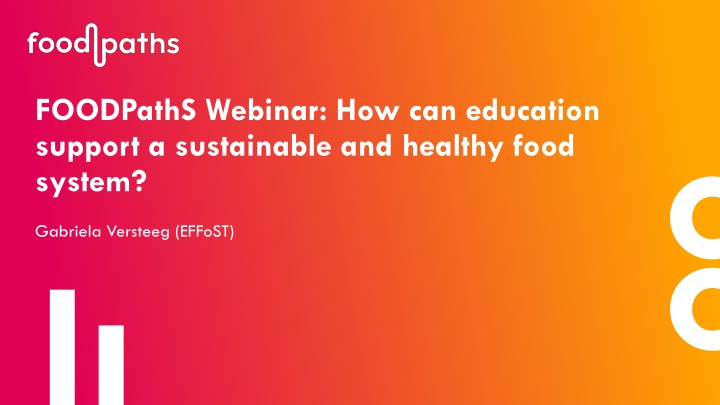
Education for Sustainable Food Systems: Insights from Webinar
Explore how education can drive a sustainable and healthy food system based on insights from the FOODPathS webinar led by Gabriela Versteeg. Discover initiatives to enhance FS education in higher education institutions, establish university-driven local food ecosystems, and meet stakeholders' needs for skilled professionals. Dive into mapping courses, understanding stakeholder requirements, and identifying drivers for quality education in food systems. Uncover the role of universities in fostering sustainable practices through curricula comparison, sustainability scores, and ecosystem interactions.
Uploaded on | 3 Views
Download Presentation

Please find below an Image/Link to download the presentation.
The content on the website is provided AS IS for your information and personal use only. It may not be sold, licensed, or shared on other websites without obtaining consent from the author. If you encounter any issues during the download, it is possible that the publisher has removed the file from their server.
You are allowed to download the files provided on this website for personal or commercial use, subject to the condition that they are used lawfully. All files are the property of their respective owners.
The content on the website is provided AS IS for your information and personal use only. It may not be sold, licensed, or shared on other websites without obtaining consent from the author.
E N D
Presentation Transcript
FOODPathS Webinar: How can education support a sustainable and healthy food system? Gabriela Versteeg (EFFoST)
Establishing a branded network of university-driven local food eco-systems Objectives Map FS education & training programs in Higher Education Institutes (HEI) & professional training centres, Establish an improved FS education and training program by helping to fill skills and knowledge gaps, Establish a branded network of EU (university-driven) ecosystems to foster Food2030-inspired FS transitions.
Understanding Stakeholders needs implementation of the innovations and need for specifically educated professionals creating awareness Primary/secondary schools Industry Higher Education & Research Institutes Pathways to careers, ambitions and persoanl values Students and young researchers Nutritionists /society focus on affordable, accepted and attainable Policymakers Stategic Research & Innovation Agenda Research, Innovation, Policy Advice and Education programs Living Labs & Start-ups, Parcs, cities transfer of innovations and technologies, exploitation
Results - Mapping Bachelor Master Course Mapping Post Graduate Course Mapping total of 74 programs found in 23 countries at University level (UL) total of 15 programs found in 7 countries at Post Graduate level (PGL) Spain was the country with the highest number of programs (15 UL/6 PGL) followed by Italy (10 UL/4 PGL) Top 15 based on 3 rankings and 5 SFS education programs
Results - Drivers Distribution of driver ideas for SFS education at the University (Bachelor/Master) level and across seven transition categories The most important in quality of SFS education seems to be strengths of people involved i.e., the skills of teachers and the motivation of students Try and keep interests level high genuine interest peer observation, action-learning, problem- solving, professors are part of the food city council Exchange programmes among teachers learning about online courses
Comparing universities Mapping via sustainability scores, Surveys and interviews, Comparing curricula, sustainability charts, interaction with ecosystem Receiving input from ICA, Leading universities on curricula, Leading universities on sustainability, CleverFood project, FOSSNET HEI network from EIT Food & Master of sustainable food systems,
Preliminary findings survey Food systems approach (eg. food waste management system and sustainable food options available) in campus is not widelyspread approach is present in bachelor and master studies, but less at lifelong learning programs definition is known but not always well placed in curricula community gardens, demonstration sites, intership programmes are important part of teaching CSR Sustainable Food Systems CSA (Climate Smart Agriculture) practices (farm or box scheme) are already in teaching, but not aligned with wider SFS approach not many Universities have a corporate social responsibility programs, follow a specific standard or label (e.g., ISO 26000) or have action plan aimed at achieving the SDGs requires cooperation and continuous communication with business - (1) reporting on training and skills needs in the SFS (2) indicating trends and public policy frameworks (EU and national) for the development of the SFS to companies systemic approach
Preliminary recommendations - Principles, rules, law to support internal organisation and corporate practises - Fostering multicator cooperation on curricula and accreditation (business- science-policy) - Identification of needs from business and their proper understanding of SFS transformation; innovations, trends, EU/national policy that influences economy transformaton Universities learn from each other networking and good practises on SFS education in practise
Thank you! Questions SciFoodHealth Sustainable Food Systems Network www.foodpaths.eu SciFoodHealth www.foodpaths.eu






















